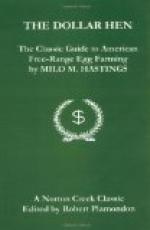The third way in which experiments are made worthless is by the introduction of factors other than the one being tested. This may be done by chance, and the conductor not realize the presence of the other factor, or the varying factors may be introduced intentionally under the belief that they are negligible. Of the first case an instance may be cited of the placing of two flocks in a house, one end of which is damper than the other, the accidental introduction into one flock of a contagious disease, or one flock being thrown off feed by an excessive feed of greens, etc., etc. These factors that influence pens of birds greatly add to the error of the law of chance. In fact it amounts to the same thing on a larger scale. For this reason not only are many individuals, but many flocks, many locations, and many years needed to prove the superiority of the contrasted methods.
The criticisms in the following section will amply illustrate the case of foreign factors being unwisely introduced into an experiment.
The Egg Breeding Work at the Maine Station.
As is well known the Maine Station was for years considered by all poultrymen to be doing a great and beneficial work in breeding for increased egg production. Up until the fall of 1907, the poultrymen of the country were of the opinion that this work was in every way successful, and a large number of private breeders had taken up the use of trap-nests in an effort to build up the egg production of their fowls.
When early in 1908 Bulletin 157 of the Maine Experiment Station was published, it showed by averages as given in the table on page 202 that the egg yield at the station was for the entire period on the decline. In Bulletin 157, the statement was made that “arithmetical mistakes” and “faulty statistical methods” accounted for the discrepancies between the former publications and the criticised data. The further explanation that “the experiment was a success as an experiment,” etc., only appeared to the public mind as a graceful way of explaining what was, to the practical man, an utter failure of the entire work.
The unfortunate death of Professor Gowell, together with the fact that he had equipped a private poultry farm with station stock, added to the confusion, and the result of the bulletin was the precipitation of a general “pow-wow” in which the poultry editors were about equally divided between those who were casting insinuations upon the personnel of the station, and those who decried the whole effort toward improving the egg yield.
After going over the publications of Professor Gowell, visiting the station and meeting the present force, I came to the following conclusions regarding the matter:
Professor Gowell’s work is open to severe criticism. Errors have been made in conducting the work at Maine which have made it possible for a mathematical biologist to take the data and seemingly prove that selection, as practiced by Professor Gowell, actually resulted in lowering inherent egg capacity of the strain of Plymouth Rock hens under experimentation. Had Professor Gowell’s successor been a practical poultryman, it is my candid opinion that the public would have been given a radically different explanation of the results.




